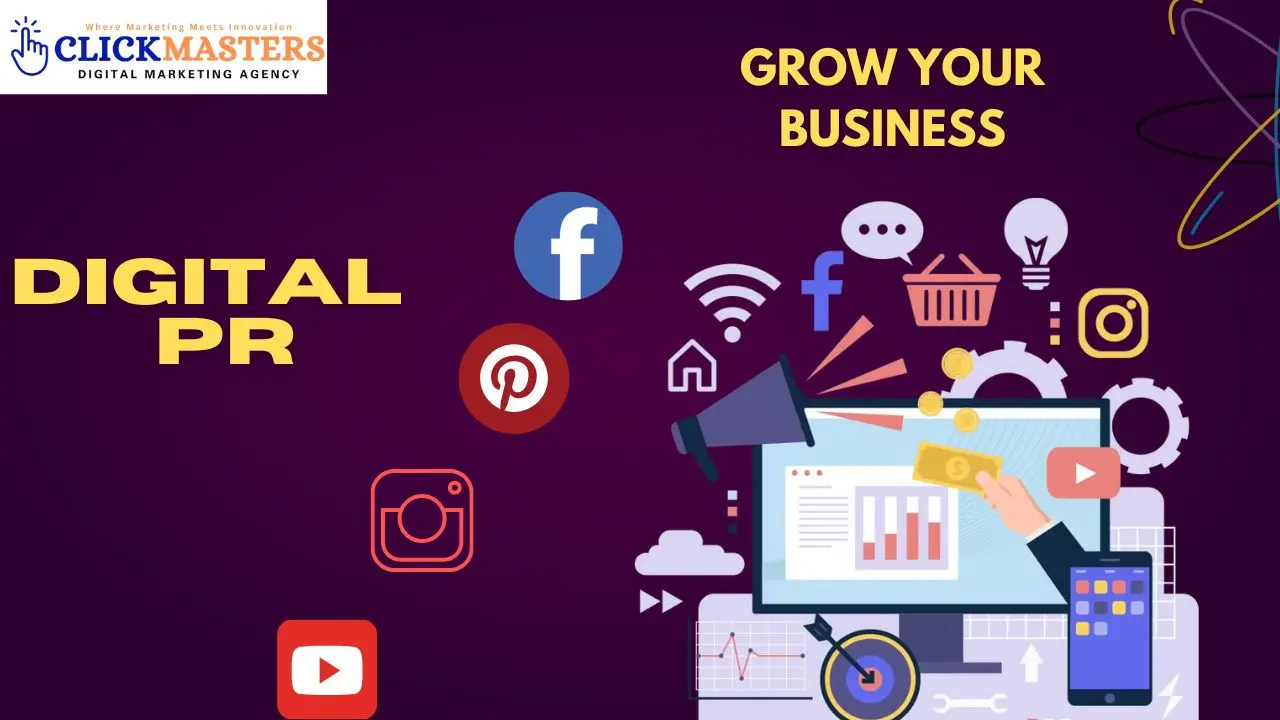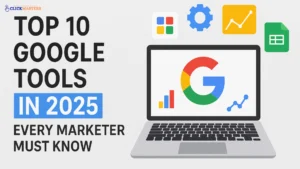Digital PR is a way to enhance your brand online by securing mentions, links, and features on reputable websites, blogs, and news platforms. It helps you get noticed by both search engines and real people by sharing stories, data, or news through digital channels like social media, online news, and influencer platforms.
Unlike traditional PR, which uses newspapers, magazines, and TV, digital PR focuses on online coverage. It also helps improve SEO by earning backlinks that build authority and drive traffic to your website. This makes digital PR a powerful tool for growing your online presence.
What is Digital PR?
Digital PR is an online marketing strategy that builds brand awareness through the acquisition of backlinks, media coverage, and influencer outreach. It helps improve search rankings by earning high-authority mentions. Unlike ads, digital PR builds long-term trust and visibility.
Key Components of Digital PR
Include creating newsworthy content, building relationships with journalists, and securing backlinks from high-authority websites. It also involves influencer outreach, press release distribution, and active engagement on social media platforms.
Press Releases for Online Platforms
Well-crafted press releases help share brand news with media outlets and boost visibility on search engines through backlink opportunities.
Blogger and Influencer Outreach
Collaborating with bloggers and influencers helps promote your brand to niche audiences and earns trusted mentions that support off-page SEO.
Online Publications and Journalist Connections
Building strong media relations ensures your content gets featured on high-authority news sites, driving both credibility and traffic.
Brand Storytelling and Digital Branding
Creating a compelling brand story enhances your online identity, enabling you to stand out and capture the attention of both the media and your audience.
Understanding Off-Page SEO
Off-page SEO refers to all the actions taken outside your website to improve its ranking in search engine results. It includes backlinks, brand mentions, social signals, and online reputation. These elements help search engines see your site as trustworthy and authoritative.
Off-Page SEO vs. Digital PR: What’s the Difference?
Off-page SEO is all about improving your site’s ranking by gaining quality backlinks, mentions, and online trust from other websites. It’s focused on technical signals that influence how search engines rank your site.
Digital PR, on the other hand, is a strategic method that utilises storytelling, media outreach, and influencer collaboration to earn those links and mentions naturally. While off-page SEO focuses on the results, digital PR is the creative process behind achieving them.
Get More Backlinks & Traffic

Unlock your SEO potential with Digital PR boost backlinks, traffic, and authority today!
- Boost your SEO with quality backlinks.
- Increase traffic and brand visibility.
- Build authority and trust online.
Why Quality Online Content Is Crucial
Good content is the heart of any strong digital PR or SEO strategy. When your content is helpful, engaging, and easy to understand, people are more likely to read it, share it, and link to it. Search engines like Google also reward quality content by showing it higher in search results. This means more visibility, more traffic, and better trust from both users and search engines. In short, great content brings excellent results.
How Digital PR Impacts Off-Page SEO
1. Link Building Through High-Authority Sites
Digital PR helps secure backlinks from trusted websites, blogs, and news platforms. These links boost your domain authority and improve how search engines rank your content. Learn more about effective link-building strategies to enhance your SEO efforts and drive more traffic to your site.
Example: Outreach campaigns, newsworthy press releases, and platforms like HARO (Help a Reporter Out) are powerful tools for securing feature placements in top publications.
2. Brand Mentions That Strengthen SEO
Even when there’s no clickable link, brand mentions on reputable sites still boost SEO. Search engines recognise these signals and count them as indicators of trust.
Digital PR tactics, such as expert interviews, media pitching, and data sharing, can help your brand gain visibility in high-value online conversations.
3. Building Online Authority and Trust
By getting featured on trusted websites, digital PR enhances your brand’s credibility and relevance within your niche. This signals to Google that your site is an expert source.
Favourable press mentions also help establish topical authority, a factor that is playing an increasingly significant role in modern SEO rankings.
4. Driving Referral Traffic and Engagement
When your brand is featured in online articles or blogs, it can drive targeted traffic back to your site. These visitors often stay longer and interact more.
This results in lower bounce rates, higher engagement, and positive behavioural signals that support your site’s SEO performance.
5. Thought Leadership Boosts Purchases
When your brand is seen as a thought leader through digital PR, people begin to trust your advice and expertise. This trust often leads to higher conversion rates and more sales.
By sharing expert opinions, insights, and data in online publications, Digital PR positions your brand as a go-to source, encouraging customers to buy from someone they believe in.
Digital PR Strategies for Improving Off-Page SEO

1. Identify Target Media Outlets
- Research Niche-Relevant Websites
Look for blogs, news sites, and online magazines that cater to your industry or audience. - Check Domain Authority
Utilise tools like Moz, Ahrefs, or Semrush to identify media outlets with high Domain Authority (DA) for enhanced SEO value. - Analyse Audience Engagement
Select platforms that have an active readership, strong social media shares, and high user interaction. - Study Previous Content
Please review the types of stories they publish and focus on outlets that cover expert quotes, insights, or press releases. - Create a Target Media List
Organise a list of top media contacts and websites for future digital PR campaigns and outreach.
2. Start with Shareable, Link-Worthy Content
Create content that solves real problems, shares new data, or tells a unique story. This kind of content naturally earns backlinks because others want to share or cite it.
3. Engage Niche Bloggers and Micro-Influencers
Partner with bloggers and influencers in your industry. Their loyal followers trust their content, which helps you gain targeted backlinks and boost your brand visibility.
4. Craft SEO-Optimised Digital Press Releases
Write press releases that include keywords and strong headlines. Distribute them through digital channels to get picked up by online news sites and build quality backlinks.
5. Pitch to Journalists for High-Authority Features
Reach out to journalists with valuable stories or expert insights. Being featured on trusted platforms like Forbes or TechCrunch provides your SEO with a significant credibility boost.
6. Position Your Brand as an Industry Thought Leader
Share expert advice, research, or opinions through guest posts and interviews. Being perceived as a leader fosters trust and earns long-term credibility from respected sources.
Tools to Support Digital PR and Off-Page SEO
🔧 Recommended Tools:
- Ahrefs – Track backlinks, referring domains, and competitor link profiles.
- BuzzSumo – Discover trending content and identify influencers for outreach.
- Semrush – Analyse backlinks, monitor brand mentions, and audit SEO performance.
- Muck Rack – Find journalists, manage PR campaigns, and track media coverage.
- Google Alerts – Get real-time notifications when your brand is mentioned online.
How to Measure the Impact of Digital PR on Off-Page SEO

One of the best things about Digital PR is that you can track what’s working and what’s not. This helps you improve your results and grow faster. Here are some simple ways to measure your success:
1. Clicks on Your Link
If someone clicks a link in your article or press release and lands on your website, that’s a good sign. You can track how many people clicked using tools like Google Analytics.
2. Number and Quality of Backlinks
Backlinks are links from other websites to your site. The more high-quality links you acquire, the better your SEO will be. Use tools like Ahrefs or Semrush to check how many good links you earned.
3. Social Media Shares
Check how many people shared your content on social media. If your campaign is shared frequently, it means more people have seen and trusted your message.
4. Brand Mentions (With or Without Links)
Even if someone mentions your brand without a link, it still helps your online presence. Utilise tools like Google Alerts or Mention to track where your brand is mentioned.
5. Leads and Sales
Did you see an increase in the number of people signing up, calling, or making a purchase after the campaign? That means your Digital PR is not only building your name, it’s also bringing in real results.
6. Website Traffic and Visitor Quality
Look at how many people visited your website from your PR content. If they stay longer or check more pages, that’s a strong sign they’re interested.
7. Website Authority Score
Over time, good PR gives you stronger trust online. Tools like Moz or Ahrefs show your authority score going up, which helps your site rank better in Google.
8. Return on Investment (ROI)
Ask yourself: Was the campaign worth the time or money? Maybe it gave you more traffic, better visibility, or more people talking about your brand; that’s a win!
Why Digital PR Should Be Part of Your SEO Strategy
Digital PR is more than just getting your name out there; it helps improve your SEO in powerful ways. It brings you:
- High-quality backlinks from trusted sites
- Brand mentions that boost visibility.
- Stronger authority in your niche
- More traffic from people who trust the sources
If you’re serious about growing online, it’s time to make Digital PR a key part of your SEO plan. It builds trust, brings results, and keeps your brand in the spotlight. Start small, stay consistent, and you’ll see real growth over time.
FAQs
1. What is Digital PR in SEO?
Digital PR is a method for promoting your brand online through press releases, influencer outreach, and securing media coverage. It helps you get high-quality backlinks and improve your SEO rankings.
2. How does Digital PR improve off-page SEO?
It helps by getting your website mentioned and linked on trusted websites. This enhances your site’s authority and improves its ranking in search engine results.
3. What’s the difference between Digital PR and traditional PR?
Traditional PR works with newspapers, radio, and TV. Digital PR focuses on online channels, such as blogs, news sites, and social media, to reach a broader digital audience.
4. How can I measure the success of my Digital PR campaign?
Track things like backlinks, website clicks, social shares, brand mentions, and new leads or sales to see how well your campaign worked.
5. Do social media shares help with SEO?
Yes, social shares increase your content’s reach and visibility. While they don’t directly boost SEO, they help more people find and link to your content.









